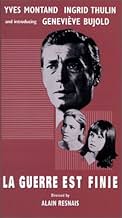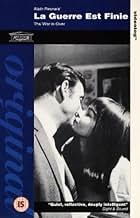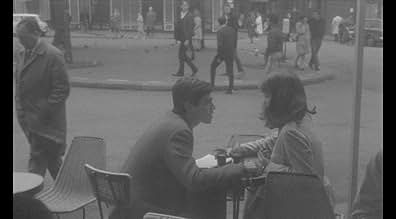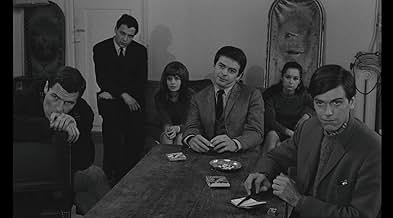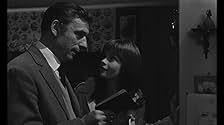IMDb-BEWERTUNG
7,3/10
2581
IHRE BEWERTUNG
Füge eine Handlung in deiner Sprache hinzuA veteran Republican fighter's ardent dedication to overthrow of Franco's regime is challenged. He realizes that the center of political struggle has shifted away from him, and is forced to ... Alles lesenA veteran Republican fighter's ardent dedication to overthrow of Franco's regime is challenged. He realizes that the center of political struggle has shifted away from him, and is forced to make choices about his life and political ideals.A veteran Republican fighter's ardent dedication to overthrow of Franco's regime is challenged. He realizes that the center of political struggle has shifted away from him, and is forced to make choices about his life and political ideals.
- Für 1 Oscar nominiert
- 4 Gewinne & 4 Nominierungen insgesamt
Empfohlene Bewertungen
Alain Resnais was part of the so-called Left Bank of the French New Wave, alongside with Varda, Marker and Demy, who were politically much more aware compared to the film fanatics of Cahiers du Cinema (Rohmer, Truffaut, Rivette, Godard, Chabrol). Alain Resnais has always been interested in past but here he focuses on its impact with regards to the future. The War Is Over was his fourth feature, following Hiroshima mon amour, Last Year in Marienbad and Muriel, and still remains as one of the finest films of political cinema. The film builds around the theme of how to come to terms with one's past in order to live in peace with the present. No other place -- maybe Germany or Poland -- offers such a great setting for this but Spain because the shadows of the Civil War are so present. It is a milieu that has become the symbol of the war, so to speak.
Diego Mora (Yves Montad) is an old man who spent his youth as a revolutionary in the Spanish Civil War. Now, thirty years later, he's part of a group that wants to redeem the dreams of the revolution in Paris. All the members of the group are living in the past, and so is Diego. But soon he has a moment of realization and breaks himself away from the chains of illusion and decides to make a change. Thus, The War Is Over is really a story about a man who is living a lie. It tells, rather bleakly in a melancholy tone, about old communists who can't let go off the past.
The War Is Over might just be Resnais' most satisfying work when it comes to somewhat coherent viewing experience. It's his first film with a clear storyline which is relatively easy to follow even if the editing was deliberately (but not self-deliberate!) ambiguous and confusing. Resnais has succeeded perfectly to relay the flow of time. Moreover, through the character played by Yves Montand the viewer can understand the director's thoughts and emotions, no matter how shattered, because he holds the pieces together. It is he through whom the viewer constructs the big picture.
In The War Is Over memories are created for the future. Alain Resnais doesn't try to build the horrors of the past by newsreel footage. He relays the tragedy of the conditions by showing how people are still living in the past, how they are left with unredeemed dreams in their hands. The dream has died in Spain. Of course, Spain is still there but merely as a concrete place full of tourists. People don't understand each other. There is a major breakdown in the communication between the old and the new left. Both are dreaming of a revolution but in their own ways. The legacy of the past torments the protagonist. However, he is not only forced to recall the past endlessly but also to be unable to understand the present reality.
Diego Mora (Yves Montad) is an old man who spent his youth as a revolutionary in the Spanish Civil War. Now, thirty years later, he's part of a group that wants to redeem the dreams of the revolution in Paris. All the members of the group are living in the past, and so is Diego. But soon he has a moment of realization and breaks himself away from the chains of illusion and decides to make a change. Thus, The War Is Over is really a story about a man who is living a lie. It tells, rather bleakly in a melancholy tone, about old communists who can't let go off the past.
The War Is Over might just be Resnais' most satisfying work when it comes to somewhat coherent viewing experience. It's his first film with a clear storyline which is relatively easy to follow even if the editing was deliberately (but not self-deliberate!) ambiguous and confusing. Resnais has succeeded perfectly to relay the flow of time. Moreover, through the character played by Yves Montand the viewer can understand the director's thoughts and emotions, no matter how shattered, because he holds the pieces together. It is he through whom the viewer constructs the big picture.
In The War Is Over memories are created for the future. Alain Resnais doesn't try to build the horrors of the past by newsreel footage. He relays the tragedy of the conditions by showing how people are still living in the past, how they are left with unredeemed dreams in their hands. The dream has died in Spain. Of course, Spain is still there but merely as a concrete place full of tourists. People don't understand each other. There is a major breakdown in the communication between the old and the new left. Both are dreaming of a revolution but in their own ways. The legacy of the past torments the protagonist. However, he is not only forced to recall the past endlessly but also to be unable to understand the present reality.
10hhs-3
CAUTION: NOTES ON PLOT INCLUDED
Well, if you think this movie is about hot sex and Franco, then you could stick to Hemingway. A stunning psychodrama about a man who has seen his life burned out after decades of fighting a "good" but hopeless war, recognizes the futility, and sees another generation committing itself to figurative and literal suicide. Does he stop them? Join them? Can he have any effect at all? Does he try? See the movie. If you're into political drama a la Frankenheimer, Zinnemann, or Costa Gavras, this one is a "ten."
But you're right about Genevieve Bujold. Are you ever 8-)
Well, if you think this movie is about hot sex and Franco, then you could stick to Hemingway. A stunning psychodrama about a man who has seen his life burned out after decades of fighting a "good" but hopeless war, recognizes the futility, and sees another generation committing itself to figurative and literal suicide. Does he stop them? Join them? Can he have any effect at all? Does he try? See the movie. If you're into political drama a la Frankenheimer, Zinnemann, or Costa Gavras, this one is a "ten."
But you're right about Genevieve Bujold. Are you ever 8-)
"Patience and irony are the chief virtues of a Bolshevik."
Beautifully shot, with splashes of visual flair, like the fast edits or the scenes with the exquisite shimmering of light on the ceiling, an echo of the haze of looking back on a life of an underground struggle against fascism in Spain following the Civil War. The film highlights the need for perseverance, brotherhood, and sacrifice over the long haul to achieve regime change, as well as the melancholy that comes from perceiving that at some point one's own personal "war" may be over, but the movement will continue on in younger hands.
I loved the idea of it, but unfortunately, the story is about as dry as toast, and it takes far too long to get to the most interesting bit, which was the old guard revolutionary (Yves Montand) confronted with newer radicals who disagree with him on tactics. I wish that part had been more developed. There is just too much time spent on mundane aspects beforehand, the details for which were rather muddled, to sustain a two hour film. Even the presence of Geneviève Bujold and Ingrid Thulin couldn't save it from being a dull affair, and how Resnais shot the love scene between Bujold and Montand in such a (nearly comical) artsy way didn't help matters. As an exercise in filmmaking and with these stars, it holds some level of interest, but it's hard to see how anyone could get excited over it. Seeing it once was enough.
Beautifully shot, with splashes of visual flair, like the fast edits or the scenes with the exquisite shimmering of light on the ceiling, an echo of the haze of looking back on a life of an underground struggle against fascism in Spain following the Civil War. The film highlights the need for perseverance, brotherhood, and sacrifice over the long haul to achieve regime change, as well as the melancholy that comes from perceiving that at some point one's own personal "war" may be over, but the movement will continue on in younger hands.
I loved the idea of it, but unfortunately, the story is about as dry as toast, and it takes far too long to get to the most interesting bit, which was the old guard revolutionary (Yves Montand) confronted with newer radicals who disagree with him on tactics. I wish that part had been more developed. There is just too much time spent on mundane aspects beforehand, the details for which were rather muddled, to sustain a two hour film. Even the presence of Geneviève Bujold and Ingrid Thulin couldn't save it from being a dull affair, and how Resnais shot the love scene between Bujold and Montand in such a (nearly comical) artsy way didn't help matters. As an exercise in filmmaking and with these stars, it holds some level of interest, but it's hard to see how anyone could get excited over it. Seeing it once was enough.
Yves Montand is a Spaniard in exile in Paris, a Communist working for the central committee in exile in Paris, trying to jump-start the Revolution. He's very professional about what he does. But the Spanish government has arrested agents and he realizes he's grown tired of the never-ending struggle, the insistence of the committee in Paris that their view from a distance gives them better insight than the people who are stationed in Spain. His lover, Ingrid Thulin wants his child, and he indulges in.a tired rant in front of her friends./coworkers tat everything moves and nothing changes.
Montand gives a fine performance as a man growing tired of the always hopeful attitude of the revolutionaries, their insistance on working out the details of life, anxious to snatch small bits of autonomy wherever he can He has grown tired of being a good soldier who sees no end to the war. Will he remain a good soldier? Can he? And what if he cannot?
Alain Resnais movie is far more straightforward than his other works, although he does make liberal use of flashbacks and interpolative stills. With Geneviève Bujold, Jean Dasté, and Michel Piccoli.
Montand gives a fine performance as a man growing tired of the always hopeful attitude of the revolutionaries, their insistance on working out the details of life, anxious to snatch small bits of autonomy wherever he can He has grown tired of being a good soldier who sees no end to the war. Will he remain a good soldier? Can he? And what if he cannot?
Alain Resnais movie is far more straightforward than his other works, although he does make liberal use of flashbacks and interpolative stills. With Geneviève Bujold, Jean Dasté, and Michel Piccoli.
Deleuze indicates that Resnais is one of the greatest political film-makers in the West, in modern cinema. According to him, this greatness comes from that they know how to show how people are what is missing, what is not there instead of presence of the people. Also, this film is related to a Spain that will not be seen: do the people in the old central committee stand with the young tereosits or the tired militant?
Wusstest du schon
- WissenswertesScreenwriter Jorge Semprún's life and work as a member of the central committee of the Spanish Communist party from 1954 to 1965 are the basis of the character Diego Mora played by Yves Montand actions and thoughts in 'La Guerre est finie'.
- VerbindungenReferenced in What's My Line?: Yves Montand (2) (1967)
Top-Auswahl
Melde dich zum Bewerten an und greife auf die Watchlist für personalisierte Empfehlungen zu.
- How long is The War Is Over?Powered by Alexa
Details
- Erscheinungsdatum
- Herkunftsländer
- Sprachen
- Auch bekannt als
- The War Is Over
- Drehorte
- Boulevard Saint-Germain, Paris 6, Paris, Frankreich(tailing the young man at Metro Maubert)
- Produktionsfirmen
- Weitere beteiligte Unternehmen bei IMDbPro anzeigen
- Laufzeit2 Stunden 1 Minute
- Farbe
- Sound-Mix
- Seitenverhältnis
- 1.66 : 1
Zu dieser Seite beitragen
Bearbeitung vorschlagen oder fehlenden Inhalt hinzufügen

Oberste Lücke
By what name was Der Krieg ist vorbei (1966) officially released in Canada in English?
Antwort
